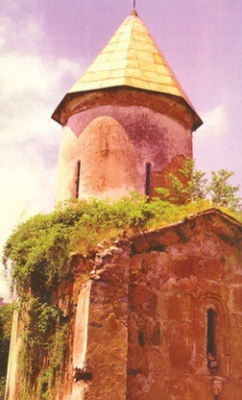The ancient world was made up of important civilisations whose legacy lives with us today. One of those civilisations was Caucasian Albania. It existed from the 4th century BC to the 8th century AD, in an area that covered most of Transcaucasia, on a cultural crossroads between other important civilisations. This included most of the current territory of modern-day Azerbaijan and a part of Dagestan. Modern Azerbaijan regards itself as the successor state to Caucasian Albania, and much of the rich culture of the country has its roots in its heritage from this great empire. To understand modern Azerbaijan, it's helpful to understand how it grew out of this ancient legacy.
Proud and independent
Caucasian Albania survived for well over a thousand years, repelling invaders and reasserting its independence. In the first century BC, the peoples of Caucasian Albania united with those of Armenia and Georgia to repel two attempted Roman invasions. Under the military leadership of Pompey in 66-65 BC and Lucullus in 69-67 BC, the Romans attempted to entirely subjugate Caucasian Albania. They won a major battle and completely conquered some of the neighbouring states, but Caucasian Albania retained a degree of independence.
Another neighbour with designs on the territory of Caucasian Albania was the Persian Sassanids. This powerful empire took partial control of the territory in the late 3rd century AD, but Caucasian Albania retained its own culture, sovereign, army and currency. In the 5th century AD (450-451) the people of Caucasian Albania revolted against the Sassanids. This struggle continued for centuries, with the Sassanids destroying the dynasty of the Albanian Emperors in the 6th century. This didn't prevent the Caucasian Albanians from continuing their battle to regain their freedom, and in the 7th century under the leadership of Javanshir of Girdman they finally regained their independence. Later, in the 7th century, Arab armies would invade, but it would take them several decades to finally conquer Caucasian Albania after Javanshir was assassinated in 669. It wasn't until the beginning of the 8th century that Caucasian Albania finally became a full part of the Arabian Caliphate, and its independence was lost. Despite this, the heritage of Caucasian Albania lived on through the centuries, in literature, music, language and the built environment. It influenced subsequent rulers of the region and continues to do so to this day.
An ancient capital
The city of Gabala was the centre of Caucasian Albania, with archaeological records suggesting it functioned as the capital from the 4th century BC. The ruins of the ancient walled city are still visible today and are popular with visitors. Its location on the ancient Silk Road made it a wealthy regional centre, where cultures mixed and traders plied their wares. It was known by writers from many different cultures, such as the Roman, Pliny the Younger and the Greek, Ptolemy. It was a bustling capital at the heart of a vibrant culture.
Home to the Udi
people The Udi people are the direct descendants of this proud civilisation. Today they number around 10,000 with most still living in and around the Gabala area. The Udi language has evolved from the language spoken in Caucasian Albania all those centuries ago. When you hear Udi people speak their native tongue, you get a glimpse of how people spoke in this region in ancient times. It makes them a very important part of modern-day Azerbaijan, and they are fiercely proud of their historical culture and legacy.
Historic churches
In the early 4th century, Christianity was adopted as the state religion of Caucasian Albania, and this Christian heritage lives on today. In the Caucasian Albanian period, the church was briefly independent. This fascinating branch of Christianity can be experienced in the region's churches such as at the Church of St Elishe in Kish, and the Udi church of Saint Elisæus at Nij. There are also ancient monasteries that can be explored.
Azerbaijan is the successor state to Caucasian Albania
The fascinating history of Caucasian Albania is something which modern-day Azerbaijan is rightly proud of. Its history is a part of the modern nation's inheritance, and its influence lives on in its language, landscape, heritage and people. It's a fascinating legacy to explore, and one of the reasons why Azerbaijan should be on every traveller's list of places to visit.
By K.B.
More about:
















































